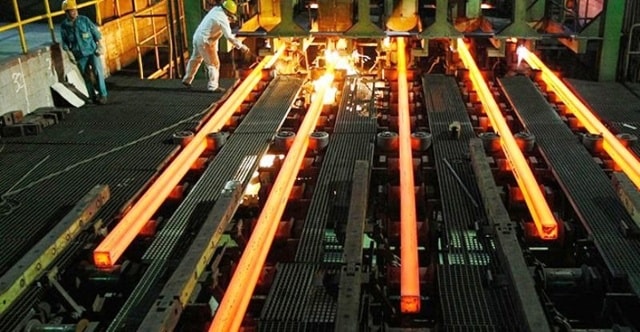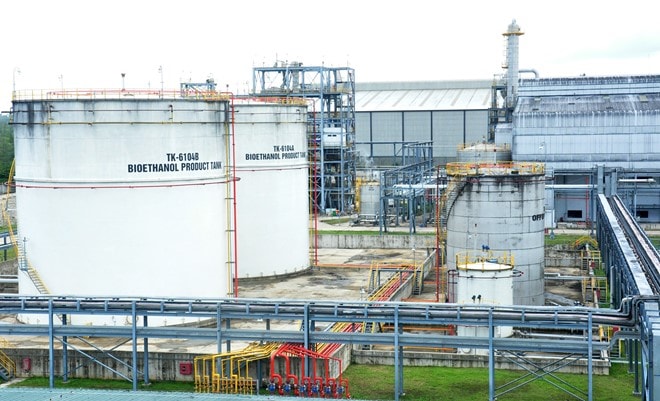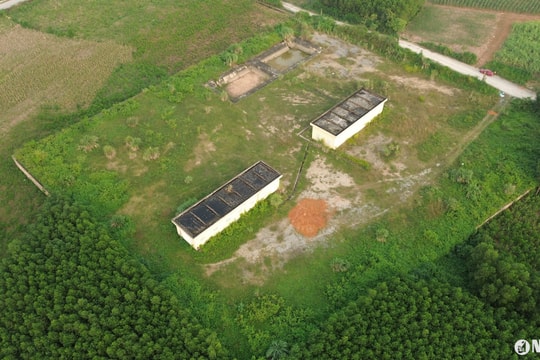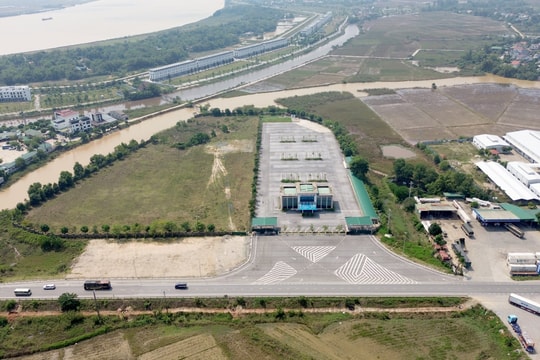A series of scandalous projects of the 'big guy' Ministry of Industry and Trade
The second phase expansion project of the Thai Nguyen Iron and Steel Plant is one of many trillion-dong projects of enterprises under the Ministry of Industry and Trade that are "shelved".
"The Government will not continue to throw thousands of billions of dollars into Thai Nguyen steel and iron," Prime Minister Nguyen Xuan Phuc emphasized at the conference to review the first 6 months of the year and deploy tasks for the last 6 months of 2016 of the Ministry of Industry and Trade.
In fact, Thai Nguyen iron and steel mentioned by the Prime Minister is one of many trillion-dong projects of enterprises under the Ministry of Industry and Trade that are in a state of "shelving" waiting for Chinese contractors, often asking for incentives from the Government, having set high expectations for production and business plans, however, the more they work, the more they lose.
 |
| Steel billet smelting at Thai Nguyen Iron and Steel Plant. |
Thai Nguyen Iron and Steel, "Vinashin" steel industry
Specifically, the project to expand phase 2 of Thai Nguyen Iron and Steel Factory, the investor is Thai Nguyen Iron and Steel Joint Stock Company (Tisco), a subsidiary of Vietnam Steel Corporation (holding 42.1%) of charter capital.
After receiving funds from the budget and restructuring a huge debt from the bank, Tisco was allowed to increase its total investment from VND3,843 billion to VND8,104 billion.
Recently, Tisco has sent a petition to the General Department of Customs, the General Department of Environment and the Hai Phong Customs Department, to remove difficulties and minimize damage to businesses in importing scrap steel.
The Thai Nguyen Iron and Steel Plant expansion project started construction in 2007, with an expected capacity of 0.5 million tons/year, and an initial total capital of VND3,843 billion.
However, after 5 years, in 2012 when the project encountered financial difficulties, contractor MCC withdrew and took more than 90% of the payment for equipment without handing over important items to the investor.
Up to now, nearly 10 years after signing the contract, the factory is still just a pile of rusted iron "covered up".
Ninh Binh Fertilizer: Loss of 2,000 billion after 4 years
In 2005, the General Chemical Corporation, now the Vietnam Chemical Group (Vinachem), proposed and received approval from the Prime Minister to invest in a factory producing urea fertilizer from coal dust, with a capacity of 560,000 tons/year, with a total investment of 667 million USD, equivalent to about 12,000 billion VND.
After negotiations, Vinachem decided to borrow 250 million USD from China with China Huanqiu Contracting & Engineering Group as the general contractor.
Although the factory uses advanced technologies introduced in the world, the equipment is supplied by Chinese contractors.
According to calculations, after completion in mid-2011, the factory will reach an output of 1,760 tons of urea/day, but it was not until March 30, 2012 that Ninh Binh Fertilizer produced the first ton of urea and began commercial operation on December 15, 2012.
According to Vinachem's report, in 2012, Ninh Binh Nitrogen Plant lost 75 billion VND, in 2013 it lost 759 billion VND, in 2014 the factory lost about 500 billion VND and in 2015 it lost over 370 billion VND.
Biofuel production plant
Vietnam National Oil and Gas Group (PVN) once said that its strategy for developing biofuels is to "go ahead and anticipate", investing in the construction of three Bio-Ethanol production plants located in the North, Central and South with an investment capital of thousands of billions of VND.
 |
| The trillion-dollar biofuel factory is operating at a standstill and is "shelved" |
However, contrary to expectations, the Tam Nong ethanol factory (Phu Tho) with an estimated investment capital of 2,484 billion VND since the end of 2011 has stopped construction, the entire factory system has been temporarily closed, security forces have been hired, and some maintenance staff have been arranged.
Binh Phuoc ethanol factory with an investment capital of 1,700 billion VND after nearly 2 years of construction has been put into trial operation, but when the ethanol biofuel was produced, there was no place to sell it, workers quit their jobs, and the factory had to temporarily stop operations.
Meanwhile, the Dung Quat Bio-Ethanol biofuel factory with a total investment of VND2,219 billion and a capacity of 100 million liters of ethanol per year has also had to operate at a standstill, barely surviving since April 2015.
Dinh Vu Fiber Factory
Dinh Vu Fiber Factory of Petrochemical and Fiber Company (PVTex) in which PVN holds over 75% of the shares, with a total investment capital of up to 325 million USD (equivalent to nearly 7,000 billion VND), but since the trial run and operation in May 2014, this factory has continuously faced the problem of not being able to sell products and temporarily stopped production.
Up to now, the project has been behind schedule for 2 years. After about 7 months of operation, it has lost more than 1,085 billion VND, and the revenue is not enough to cover the minimum costs.
PVTex has stopped operating since September 17, 2015 due to difficulties. In early 2016, PVTex planned to resume operations in the first quarter of 2016, however, the factory is still "inactive".
Faced with continuous losses, PVN has requested the State to provide support through a special mechanism to stabilize the factory and recover investment capital.
According to Zing





